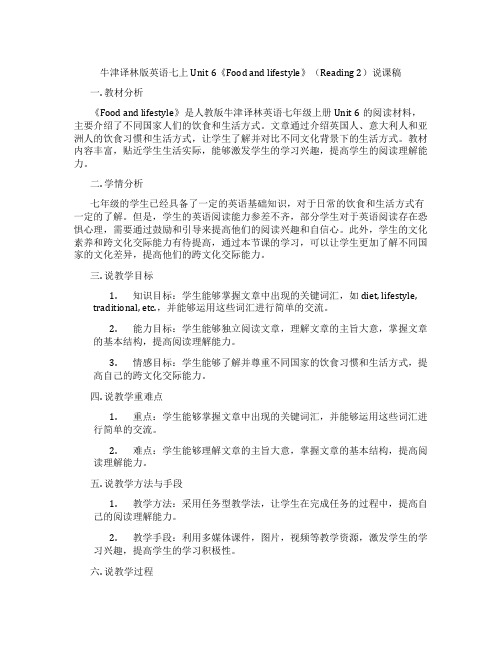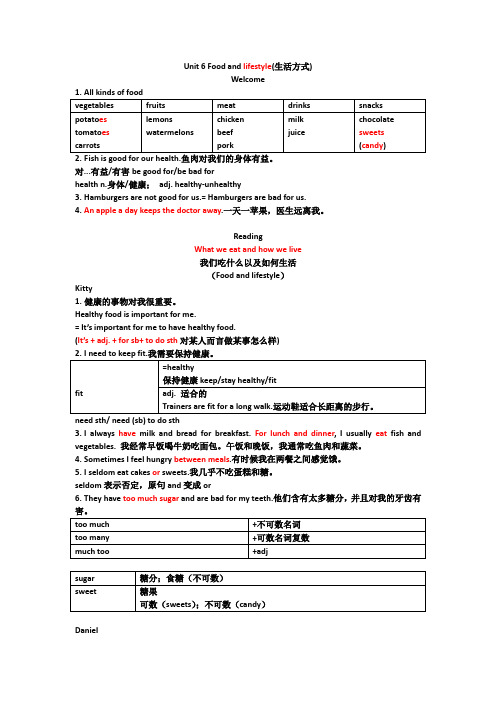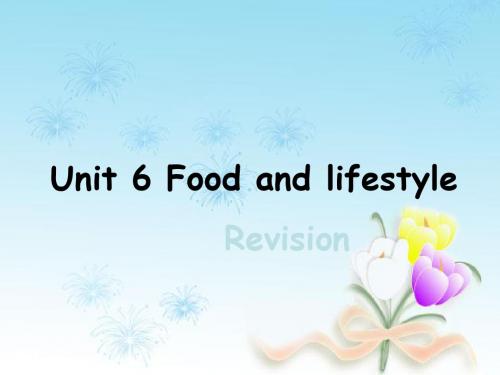牛津译林版英语七年级上册英语unit6foodandlifestyle-studyskills
- 格式:docx
- 大小:17.69 KB
- 文档页数:3






Revision of Unit 6Content: Food and lifestyleLearning aims:Knowledge objects✧To review the usage of some important words and phrases.✧To review the usage of countable and uncountable nouns.✧To review how to talk about one’s lifestyle.Ability objects✧To develop the ability of expressing ourselves in English.Moral objects✧To train team spirit through teamwork.✧To improve students’ values of health and happiness.Learning activities:Activity one Food timeStep 1 BrainstormingStep 2 The food we want✧What does Miss Yang want?Countable nouns (可数名词):Uncountable nouns (不可数名词):✧How many / how much … do we want?______________________________________________________________________________✧Do exercises:1. How many apples do the__________ (woman) teachers want at the party?2. Would you like to have __________ (banana) with them?3. I buy ten __________ (mango) and many__________ (box) of chocolate for them.4. They can tell us interesting __________ (story) at the party.5. They need three __________ (knife) to cut the apples.Activity Two: Talk timeStep 1: What we eat✧Have a talk✧Do exercises( )1. Cola ________ bad for us, but fruits are good ________ us.A. is; forB. are; toC. is; toD. are; for ( )2. What do you have ________ lunch?A. atB. forC. inD. about ( )3. I think apple juice ________.A. taste goodB. taste wellC. tastes goodD. tastes well( )4. We need ________ for our party.A. three cartons of milksB. three carton of milkC. three cartons of milkD. three carton of milk( )5. It is good for us to eat ________ meat and ________ vegetables.A. less; lessB. more; moreC. more; lessD. less; moreStep 2: How we live✧Have a talk( )1. A. snacks B. soup C. sugar( )2. A. 3 B. 4 C. 5( )3. A. seldom B. often C. alwaysActivity Three: Show timeStep 1: Show our healthy bodyStep 2: Show our love and careMake a survey(调查) and write a report.You should use what we learned in Unit 6, and the following should be included.(1)His/Her lifestyle (2)Your idea (3)Your adviceHello, everyone. Today I have a talk with my deskmate…/ my close friend…/my teacher… about his/her lifestyle. Here’s my report.She/ He _______________________________________________________________ _______________________________________________________________________________________________________________________________________________________________________________________________________________________________________________________________________________________________________________________________________________________________________________________I think _____________________________________________________________________________________________________________________________________________ Thank you.Step 3: Show our crazy EnglishExercises for Unit 6一、词汇A. 根据中文提示、英文释义或句意完成单词1. Boys and girls, don’t eat too many snacks because there is too much _________ (糖) in them.2. In Beijing, snow covers the __________ (整个的) city these days.3. There are different kinds of food in the __________ (菜单).4. Every one of us should exercise to keep __________ (healthy).5. We usually have three __________ a day. They are breakfast, lunch and dinner.B.1. There are more than 200 teachers in our school and 80 of them are __________ teachers.2. Let’s cut(切) the apple into two __________.3. ---How long do you do your homework every day? --- __________ than two hours.4. He drinks three __________ of water a day because water is the best drink.5. He wants to see a dentist(牙医) because he has two bad __________.C.1. ---Would you like _____________ some fish? It’s good for you. ---Yes, please.2. Hi, Tom, it’s time for you _____________ your lifestyle.3. ---What do you think of the pork? ---It _____________ good.4. Chicken and beef _____________ his favourite and he is fat.5. The old man seldom _____________. It’s not good.二、单项选择( )1. Which “es” has different pronunciation?A. knivesB. potatoesC. wishesD. stories( )2. ---What do you usually have ________ dinner?---A bowl of noodles and some fish.A. toB. forC. atD. in( )3. ---What’s in the fridge? ---Only ________.A. three piece of breadB. two bottles of apple juiceC. any chickenD. four cartons milk( )4. ---What about ________ a walk after dinner?---All right.A. takingB. takeC. to takeD. takes( )5. Please have more ________ food. It’s good for your ________.A. health; healthyB. healthy; healthyC. healthy; healthD. health; health ( )6. ---What does Daniel plan ________ every day?---Some fruit and vegetables.A. to eatB. eatC. eatingD. eats三、句型转换1. She dances for half an hour every day.(同义句)It ________ her half an hour ________ dance every day.2. He sleeps less than 8 hours every day. (对划线部分提问)________ ________ does he ________ every day?3. Daniel seldom exercises. (对划线部分提问)________ ________ does Daniel exercise?四、阅读理解The diet and lifestyle are very important for our health. If we don’t get the right kinds of food, we may have some health problems.Some people often eat too much meat and other food high in fat, like hot dogs and hamburgers. They don’t have enough fruit and vegetables. They are usually too fat. They are all not healthy. The best way to keep fit is to eat different food to meet our different needs.Water is very important for us, too. Some people dislike drinking water. They drink sports drinks because these drinks are cool and sweet. And they can give us much energy. But there’s much sugar in them. We should not have too many sports drinks.We should also do more exercise. Everyone should spend about an hour exercising every day. For a lot of people, their diet is OK. They should not change what they eat. They will be healthy if they do some exercise. ( )1. Which of the following food is high in fat?A. CarrotsB. CabbagesC. HamburgersD. Tomatoes( )2. The underlined word “diet” means “________”.A. the way people eatB. the way people liveC. the food people likeD. the food people dislike( )3. Why should people NOT have too many sports drinks?A. Because there is too much sugar in them.B. Because they are sweet and give us energy.C. Because get skinny after drinking them.D. Because people feel cool after drinking them.( )4. According to the passage, ________ is good for our health.A. eating too many hamburgersB. eating too much meat.C. doing exercise every dayD. sleeping twelve hours( )5. What’s the passage mainly about?A. How to keep beautifulB. What we should drinkC. What we should eatD. How to keep fit。

牛津译林版英语七上Unit 6《Food and lifestyle》(Reading 2)说课稿一. 教材分析《Food and lifestyle》是人教版牛津译林英语七年级上册Unit 6的阅读材料,主要介绍了不同国家人们的饮食和生活方式。
文章通过介绍英国人、意大利人和亚洲人的饮食习惯和生活方式,让学生了解并对比不同文化背景下的生活方式。
教材内容丰富,贴近学生生活实际,能够激发学生的学习兴趣,提高学生的阅读理解能力。
二. 学情分析七年级的学生已经具备了一定的英语基础知识,对于日常的饮食和生活方式有一定的了解。
但是,学生的英语阅读能力参差不齐,部分学生对于英语阅读存在恐惧心理,需要通过鼓励和引导来提高他们的阅读兴趣和自信心。
此外,学生的文化素养和跨文化交际能力有待提高,通过本节课的学习,可以让学生更加了解不同国家的文化差异,提高他们的跨文化交际能力。
三. 说教学目标1.知识目标:学生能够掌握文章中出现的关键词汇,如diet, lifestyle,traditional, etc.,并能够运用这些词汇进行简单的交流。
2.能力目标:学生能够独立阅读文章,理解文章的主旨大意,掌握文章的基本结构,提高阅读理解能力。
3.情感目标:学生能够了解并尊重不同国家的饮食习惯和生活方式,提高自己的跨文化交际能力。
四. 说教学重难点1.重点:学生能够掌握文章中出现的关键词汇,并能够运用这些词汇进行简单的交流。
2.难点:学生能够理解文章的主旨大意,掌握文章的基本结构,提高阅读理解能力。
五. 说教学方法与手段1.教学方法:采用任务型教学法,让学生在完成任务的过程中,提高自己的阅读理解能力。
2.教学手段:利用多媒体课件,图片,视频等教学资源,激发学生的学习兴趣,提高学生的学习积极性。
六. 说教学过程1.Pre-reading:教师通过展示不同国家的饮食习惯和生活方式的图片,引导学生谈论自己的饮食和生活方式,激发学生的学习兴趣。


Unit 6 Food and lifestyle (生活方式)Welcome2. Fish is good for our health.鱼肉对我们的身体有益。
对...有益/有害be good for/be bad forhealth n.身体/健康;adj. healthy-unhealthy3. Hamburgers are not good for us.= Hamburgers are bad for us.4. An apple a day keeps the doctor away .一天一苹果,医生远离我。
ReadingWhat we eat and how we live 我们吃什么以及如何生活 (Food and lifestyle )Kitty1. 健康的事物对我很重要。
Healthy food is important for me.= It ’s important for me to have healthy food.(It ’s + adj. + for sb+ to do sth 对某人而言做某事怎么样) 3. I always have milk and bread for breakfast. For lunch and dinner , I usually eatfish and vegetables. 我经常早饭喝牛奶吃面包。
午饭和晚饭,我通常吃鱼肉和蔬菜。
4. Sometimes I feel hungry between meals .有时候我在两餐之间感觉饿。
5. I seldom eat cakes or sweets.我几乎不吃蛋糕和糖。
seldom 表示否定,原句and 变成or6. They have too much sugar and are bad for my teeth.他们含有太多糖分,并且对我的牙齿有害。
Daniel1.I like playing computer games.我喜欢玩电脑游戏。




Unit 6 Food and lifestyle单元写作指导与演练近三年考情分析本单元以“食物”为话题,谈论个人的饮食习惯。
要求学生学会用英语表达自己或他人喜欢或不喜欢的食物,并能用英语介绍人们一日三餐的饮食情况及健康的饮食习惯。
写作时要注意like 在一般现在时中的正确运用。
(以思维导图的形式呈现)【词汇积累】lifestylenoonhamburgerkeeplemonwatermelonchocolatebeef n.牛肉carrotporksweet n.〈英〉糖果;甜点meat n.(猪、牛、羊等的)肉snack n.小吃,零食health n.健康fit adj.健康的keep fit保持健康【短语积累】1.think about 思考; 思索2. eating habits 饮食习惯3. eat well 吃得好4. for breakfast/lunch/dinner 作为早/午/晚餐5. healthy food 健康的食物6. after breakfast/lunch/dinner 早/午/晚餐后【句型积累】开头句:1. I have a healthy eating habit. 我有一个健康的饮食习惯。
2. I eat well. 我吃得好。
中间句:1. I like/don't like… 我喜欢/不喜欢……2. My favorite food is… 我最喜欢的食物是……3. He/She has a good eating habit. 他/她有一个好的饮食习惯。
4. He/She likes/doesn't like… 他/她不喜欢……5. For breakfast/lunch/dinner, I eat/have… 早/午/晚餐我吃……6. For breakfast/lunch/dinner, he/she eats/has... 早/午/晚餐他/她吃……7. For breakfast/lunch/dinner, he/she likes eating… 早/午/晚餐他/她喜欢吃……8. I don't want to be fat, so I don't eat/have… 我不想长胖, 所以我不吃……9. I think... is/are healthy/unhealthy food. 我认为……是健康的/不健康的食物。

牛津译林版英语七年级上册《Unit 6 Food and lifestyle》优秀教学设计一. 教材分析牛津译林版英语七年级上册《Unit 6 Food and lifestyle》主要讨论了食物和生活方式的话题。
通过本单元的学习,学生将能够掌握关于食物和日常生活的基本词汇和表达方式,学会如何用英语询问和描述他人的饮食和生活习惯。
教材通过丰富的图片、对话和阅读材料,激发学生的学习兴趣,培养他们的观察力和口语表达能力。
二. 学情分析七年级的学生已经具备了一定的英语基础,能够进行简单的英语交流。
他们对新鲜事物充满好奇,善于观察和模仿。
然而,部分学生可能对一些生活词汇和表达方式较为陌生,需要教师的引导和帮助。
此外,学生的学习动机和兴趣程度不同,教师应充分考虑这一因素,设计有趣且具有挑战性的教学活动。
三. 教学目标1.知识目标:学生能够掌握关于食物和生活方式的基本词汇,如vegetarian, healthy, lifestyle等;学会用英语询问和描述他人的饮食和生活习惯。
2.能力目标:学生能够在真实情境中运用所学词汇和表达方式进行交流,提高口语表达能力。
3.情感目标:学生能够意识到健康饮食和生活方式的重要性,培养良好的生活习惯。
四. 教学重难点1.重点:掌握关于食物和生活方式的基本词汇,学会用英语询问和描述他人的饮食和生活习惯。
2.难点:正确运用所学词汇和表达方式进行实际交流,尤其是对一些生活词汇和短语的运用。
五. 教学方法1.任务型教学法:通过完成各种实际任务,让学生在实践中学习和运用英语。
2.情境教学法:创设真实的生活情境,激发学生的学习兴趣和积极性。
3.合作学习法:鼓励学生分组合作,进行互动交流,提高口语表达能力。
六. 教学准备1.教材:牛津译林版英语七年级上册《Unit 6 Food and lifestyle》2.多媒体设备:电脑、投影仪、音响等3.教学素材:图片、卡片、食物模型等4.课时安排:2课时七. 教学过程1.导入(5分钟)利用图片和食物模型,引导学生谈论他们喜欢的食物,激发学生的学习兴趣。

年级:初一主备:陈月平审核:王玉琴时刻:课题:7A U6 Integrated skills 课型:新授课时安排:一课时学生姓名__________________ 家长签名__________________【学习目标】:1 能通过阅读和听录音获取有关信息。
2了解关于某人生活方式的具体信息。
3 掌握餐厅点餐用语。
【课前热身】一、预习讲义,了解本课时的单词,短语。
单词听磁带跟读3遍。
词组请在讲义顶用笔把他们划出来。
1.较少的,更少的less (原级 little)2.少于,小于less than3.多于,不单单more than4.散步 take a walk5.总的,共计的,全数的total6.数,数量 number7.得分score8.分数 point (可数名词) 9.(程度上)更多,更强 more (原级 much /many) 10.点菜order11.菜单menu 12.豆,豆科植物 bean (复数 beans) 13.行了,好吧all right 14.有---的味道taste (连系动词)1.如何维持健康how to keep fit2.你多久锻炼一次?How often do you exercise ?3.一周少于3次less than three times a week4.一周3到6次 three to six timesa week5.你每晚睡觉多长时刻? How long do you sleep every night?6.多于9小时 more than nine hours7.少于1小时less than one hour总的数量 the total number of -- 9.一共,总共 a total of10.你的分数your score11. 不错,但你的生活方式不是很健康。
Not bad ,but your lifestyle is not very healthy .12.需要更多锻炼 need to exercise more 13.吃更多的健康食物eat more healthy food14. 你想点什么? What would you like to order ?15.让咱们看看这菜单。

牛津译林版英语七年级上册《Unit 6 Food and lifestyle》教学设计6一. 教材分析牛津译林版英语七年级上册《Unit 6 Food and lifestyle》主要介绍食物和生活方式相关话题。
通过本单元的学习,学生能够掌握日常生活中常见的食物名称和生活方式相关的词汇,学会用英语简单描述自己的饮食和生活习惯。
教材内容贴近学生的生活实际,有利于激发学生的学习兴趣。
本单元包括听力、口语、阅读和写作等多个方面,全面提高学生的英语综合运用能力。
二. 学情分析七年级的学生已经掌握了基本的英语语法和词汇,具备一定的英语听说读写能力。
但部分学生对英语学习仍存在恐惧心理,不敢开口说英语,听力水平和阅读理解能力有待提高。
针对这些情况,教师应注重培养学生的自信心,激发他们的学习兴趣,采用多种教学手段提高学生的英语综合运用能力。
三. 教学目标1.知识目标:–掌握日常生活中常见的食物和生活方式相关的词汇。
–学会用英语简单描述自己的饮食和生活习惯。
–提高听力、口语、阅读和写作能力。
2.能力目标:–能够用英语进行简单的日常交流,表达自己的观点。
–提高学生的团队合作能力和自主学习能力。
3.情感目标:–培养学生热爱生活,关注健康的积极态度。
–增强学生对英语学习的兴趣,提高自信心。
四. 教学重难点•日常生活中常见的食物和生活方式相关的词汇。
•用英语描述自己的饮食和生活习惯。
•听力理解能力和阅读理解能力。
•运用英语进行日常交流。
五. 教学方法1.任务型教学法:通过完成各种任务,激发学生的学习兴趣,培养学生的团队合作能力和自主学习能力。
2.情境教学法:创设生活情境,让学生在实际语境中学习英语,提高学生的语言运用能力。
3.交际法:注重师生互动,生生互动,提高学生的英语口语表达能力。
4.听力训练法:通过听力练习,提高学生的听力理解能力。
5.阅读理解法:通过阅读练习,提高学生的阅读理解能力。
六. 教学准备1.教材:《牛津译林版英语七年级上册》。

Unit 6 Food and lifestyle—study skills&task
一.选出下列单词中划线部分读音不同的选项
1.A. what B. water C. want D.wash
2.A.five B. of C. family D. fly
3.A.thank B.think C.other D. three
4.A.zoo B. always C. pens D.bikes
5.A.wait B.visit C. picture D.time
二.单选题
1. Eat more vegetables. They _________ you.
A. are good at
B. are good to
C. are good for
D. are good with
2.Breakfast gives us energy ________ the morning.
A. to
B. for
C. on
D. in
3. She often helps Lily ________ Chinese.
A. learn
B. learns
C. learning
D. to learning
4.He drinks _______ green tea after meals every day.
A. a
B. some
C. many
D. two
5.I sometimes have rice _______ fish and an apple _____ lunch.
A. with, to
B. with, for
C. for, with
D. in, on
6.I need Amy _________ me .
A. help
B. helps
C. helping
D. to help
三.翻译下列句子
1. 我计划晚餐吃面条。
__________________________________________
2. 整个上午她很高兴。
__________________________________________ .
3. 你一天喝几杯水?
__________________________________________
4. 我需要你过来。
__________________________________________
5.你有健康的生活方式吗?
__________________________________________
四.阅读理解
Once Goethe, the great German poet, was walking in a park. He was thinking about something when he noticed he came to a very, very narrow road. Just at that time, a young man came towards him from the other end of the road. It was too narrow for both of them to pass through at the same time. They stopped and looked at each other for a while. Then the young man said rudely, “I never make way for a fool.” But Goethe smiled and said, “I always do.” Then he turned back quickly and walked towards the end of the
road.
根据短文内容,回答问题。
1. Where was Goethe walking?
________________________________________________________________
2. Who came towards Goethe from the other end of the road?
________________________________________________________________
3. Was the road too narrow for both of them to pass through at the same time?
________________________________________________________________
4. Did the young man make way for Goethe?
________________________________________________________________
5. Who turned back quickly and walked towards the end of the road?
________________________________________________________________
参考答案:
一. CDDDC
二. ADABBD
三.1.I plan to have noodles for dinner.
2.She is happy all the morning.
3.How many waters do you drink?
4.I need you to come here.
5.Do you have healthy lifestyle?
四.1. Once Goethe, the great German poet, was walking in a park
2. A young man came towards him from the other end of the road.
3.Yes,it was.
4. No, he didn’t.
5. The young man.。